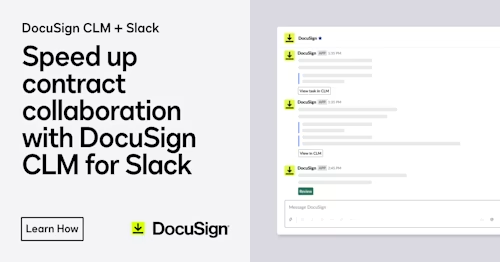
Colabora y haz avanzar tus acuerdos con Docusign CLM y Slack
La aplicación Docusign CLM for Slack te ayuda a completar los cambios, las revisiones y las aprobaciones de contratos, todo desde Slack.

Gran parte del tiempo, el esfuerzo y la colaboración previos a la firma de un contrato comienza con mucho tiempo de anticipación. Aunque ya puedes enviar, firmar y colaborar con acuerdos en Docusign eSignature for Slack, gran parte del trabajo requerido para obtener una firma tiene lugar en múltiples y diversos sistemas, para partes involucradas tanto internas como externas.
En el ambiente laboral híbrido de la actualidad, resulta crítico poder hacer negocios de forma rápida y eficiente, optimizando siempre que sea posible y minimizando el número de aplicaciones y herramientas que necesitan las partes involucradas para navegar por contratos y cerrarlos. Con las integraciones de Salesforce de Docusign, los equipos de ventas han podido transformar el proceso, desde la cotización hasta el cierre: han acelerado la generación de ingresos y el crecimiento al automatizar generación, negociación y firma de contratos en el proceso de ventas y renovación.
Sin embargo, cuando necesitas asegurarte de que los equipos de Ventas, Finanzas y Jurídico sean más productivos que nunca y trabajen para recabar firmas para cerrar un nuevo acuerdo, ¿qué mejor que colaborar, consultar y negociar acuerdos que en tu sede digital?
Aquí es donde la recién lanzada aplicación Docusign CLM for Slack resulta de gran ayuda. Con la integración CLM for Slack, puedes navegar por todos los procesos contractuales—comentar, revisar y aprobar—con la solución CLM líder de Docusign desde dentro de Slack, y con colegas y clientes por igual. Ya no habrá necesidad de revisar aprobaciones por correo electrónico o cambiar a diferentes sistemas para ver actualizaciones en el estatus. Puedes mantenerte al tanto y hacer avanzar los acuerdos de forma eficiente justo desde donde está teniendo lugar tu trabajo. La integración CLM permite a los usuarios Slack:
Delegar funciones: notifica a los usuarios en Slack sobre el papel que desempeñará cada una de las partes interesadas a medida que avanza el acuerdo y sugiere acciones que deban tomarse
Tomar acción sobre dichas funciones: haz que avancen los acuerdos con la capacidad de completar tareas, aprobar ediciones o aplicar cambios directamente en Slack
Compartir retroalimentación y resolver comentarios: brinda contexto adicional o resuelve comentarios directamente desde Slack
Revisar borradores: con un solo clic, los usuarios van directo al acuerdo para revisar borradores, ver el historial de revisiones y más
Firmar acuerdos: con eSignature, la forma #1 de firmar del mundo, los usuarios pueden firmar acuerdos rápidamente
Con procesos contractuales integrados, acelerados y simplificados en Salesforce y Slack, los clientes Docusign pueden preparar contratos, cotizaciones y facturas, monitorear y hacer cumplir términos contractuales, y controlar todo el proceso de gestión de ciclo vital de contratos (CLM) en las plataformas Docusign, Salesforce y Slack.
Checa este video para ver cómo los clientes pueden aprovechar las herramientas de colaboración con CLM y Slack para hacer avanzar sus acuerdos en menos tiempo.
Para comenzar, solo tienes que instalar la nueva aplicación Docusign CLM for Slack y habilitar Slack dentro de CLM. Para obtener información sobre otras soluciones de integración, accede a nuestro post Descubre cómo integrar Docusign a estas 8 apps empresariales.
Publicaciones relacionadas
Docusign IAM: la plataforma de acuerdos que tu negocio necesita




